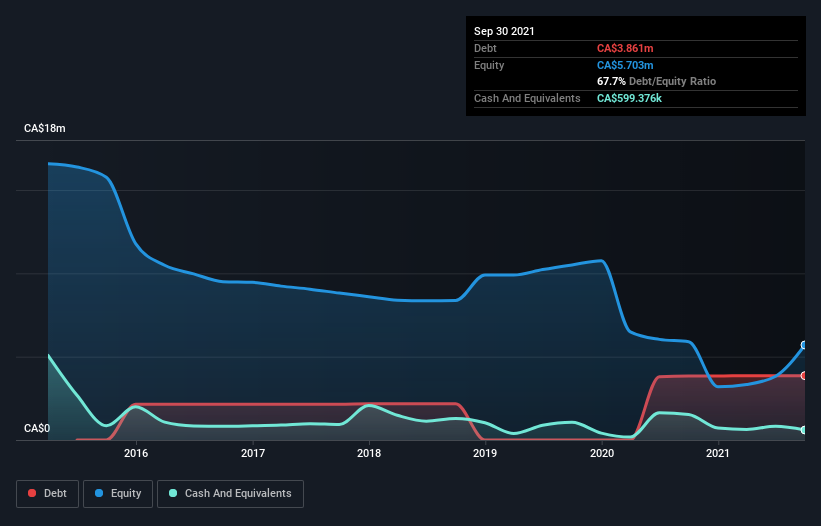The external fund manager backed by Berkshire Hathaway's Charlie Munger, Li Lu, makes no bones about it when he says 'The biggest investment risk is not the volatility of prices, but whether you will suffer a permanent loss of capital.' So it seems the smart money knows that debt - which is usually involved in bankruptcies - is a very important factor, when you assess how risky a company is. Importantly, Vital Energy Inc. (CVE:VUX) does carry debt. But is this debt a concern to shareholders?
What Risk Does Debt Bring?
Debt and other liabilities become risky for a business when it cannot easily fulfill those obligations, either with free cash flow or by raising capital at an attractive price. If things get really bad, the lenders can take control of the business. While that is not too common, we often do see indebted companies permanently diluting shareholders because lenders force them to raise capital at a distressed price. Of course, debt can be an important tool in businesses, particularly capital heavy businesses. When we examine debt levels, we first consider both cash and debt levels, together.
See our latest analysis for Vital Energy
What Is Vital Energy's Net Debt?
As you can see below, Vital Energy had CA$3.86m of debt, at September 2021, which is about the same as the year before. You can click the chart for greater detail. However, it also had CA$599.4k in cash, and so its net debt is CA$3.26m.

A Look At Vital Energy's Liabilities
We can see from the most recent balance sheet that Vital Energy had liabilities of CA$7.11m falling due within a year, and liabilities of CA$2.04m due beyond that. Offsetting these obligations, it had cash of CA$599.4k as well as receivables valued at CA$2.71m due within 12 months. So it has liabilities totalling CA$5.84m more than its cash and near-term receivables, combined.
While this might seem like a lot, it is not so bad since Vital Energy has a market capitalization of CA$14.8m, and so it could probably strengthen its balance sheet by raising capital if it needed to. But we definitely want to keep our eyes open to indications that its debt is bringing too much risk. When analysing debt levels, the balance sheet is the obvious place to start. But it is Vital Energy's earnings that will influence how the balance sheet holds up in the future. So if you're keen to discover more about its earnings, it might be worth checking out this graph of its long term earnings trend.
In the last year Vital Energy wasn't profitable at an EBIT level, but managed to grow its revenue by 94%, to CA$8.4m. With any luck the company will be able to grow its way to profitability.
Caveat Emptor
Despite the top line growth, Vital Energy still had an earnings before interest and tax (EBIT) loss over the last year. Its EBIT loss was a whopping CA$3.7m. Considering that alongside the liabilities mentioned above does not give us much confidence that company should be using so much debt. Quite frankly we think the balance sheet is far from match-fit, although it could be improved with time. However, it doesn't help that it burned through CA$730k of cash over the last year. So to be blunt we think it is risky. There's no doubt that we learn most about debt from the balance sheet. But ultimately, every company can contain risks that exist outside of the balance sheet. For example, we've discovered 4 warning signs for Vital Energy (2 are potentially serious!) that you should be aware of before investing here.
If you're interested in investing in businesses that can grow profits without the burden of debt, then check out this free list of growing businesses that have net cash on the balance sheet.
New: Manage All Your Stock Portfolios in One Place
We've created the ultimate portfolio companion for stock investors, and it's free.
• Connect an unlimited number of Portfolios and see your total in one currency
• Be alerted to new Warning Signs or Risks via email or mobile
• Track the Fair Value of your stocks
Have feedback on this article? Concerned about the content? Get in touch with us directly. Alternatively, email editorial-team (at) simplywallst.com.
This article by Simply Wall St is general in nature. We provide commentary based on historical data and analyst forecasts only using an unbiased methodology and our articles are not intended to be financial advice. It does not constitute a recommendation to buy or sell any stock, and does not take account of your objectives, or your financial situation. We aim to bring you long-term focused analysis driven by fundamental data. Note that our analysis may not factor in the latest price-sensitive company announcements or qualitative material. Simply Wall St has no position in any stocks mentioned.
About TSXV:VUX
Vital Energy
A junior oil and gas company, engages in the acquisition, exploration, and development of crude oil and natural gas in Western Canada.
Mediocre balance sheet with low risk.
Market Insights
Community Narratives





